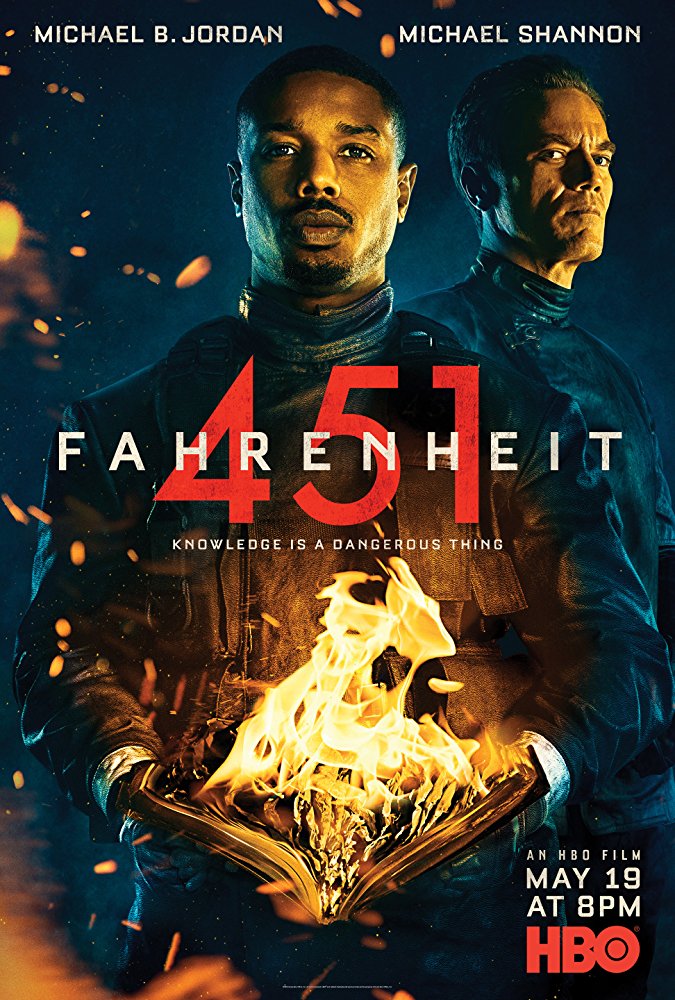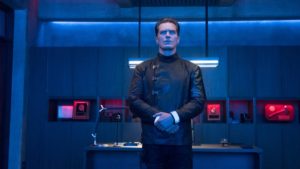Welcome back to Sound Off!, a semi-regular column where members of Speculative Chic gather together to chat about the latest BIG THING in entertainment. This time, strike a match and discuss Fahrenheit 451, which premiered on HBO in the United States on Saturday, May 19, 2018.

Sound Off! is meant to be a reaction, but not necessarily a review. After all, while we are all individuals, even mutual love of something (or hate) can come from different places: you may find everything from critique to fangirling to maybe even hate-watching.
Now, join J.L. Gribble and Kelly McCarty as they talk about Fahrenheit 451. [Note: Spoiler-free!]
 J.L.: Though I have read the original novel Fahrenheit 451, I’m glad that it was long enough ago that I was able to see this movie with (mostly) fresh eyes. As a reader and author, the book burning scenes of this film were viscerally painful to watch. As for the rest of the story, I wasn’t quite lit on fire.
J.L.: Though I have read the original novel Fahrenheit 451, I’m glad that it was long enough ago that I was able to see this movie with (mostly) fresh eyes. As a reader and author, the book burning scenes of this film were viscerally painful to watch. As for the rest of the story, I wasn’t quite lit on fire.
At first, I was really impressed by the attempts to modernize this story for the social media age, especially with the incorporation of both artificial intelligence and modern networked computers. Despite the core of the story being about the written word and rewriting history, this was conveyed well visually through the transition of language (both written and verbally) into “emoji-speak.” The movie also made an interesting attempt to envision a future where even more of our lives are lived publicly online, creating an overall vision of mob rule while the real power is concentrated in the hands of an elite few.
But the flow of the story itself left me behind a few times. For example, while feminism is referred to as a reason for some books being destroyed, the complete lack of women firefighters was jarring. And overall, I never had a real sense of how much time was passing during the latter half of the story. One night? A few months? Without that context, it felt very much like “insta-love” in the relationship between Montag and Clarisse, which was off-putting.
And overarching all of those problems was the character of Captain Beatty. I never got a good read on him — what he was doing or what his motivations were. Instead, I’m left with the impression of a straight-up pyscho who wandered through the film chewing scenery at Montag. Ultimately, none of the three major characters in this movie lived up to the acting ability of Michael B. Jordan, Michael Shannon, or Sofia Boutella.
With the weight of HBO’s production powerhouse behind it, it’s a shame that this movie wasn’t quite as sure of itself as it could have been. The technologically focused plotline made the book’s original conceit of rebels who memorize books seem quaint and unnecessary. And with such emphasis on Montag’s personal journey, its abrupt ending leaves me with a watered-down feeling about the rest of the film’s world.
 Kelly: I was incredibly excited for HBO’s adaptation of Fahrenheit 451 — Michael B. Jordan is red-hot after his performance in Black Panther, Michael Shannon is a reliably creepy villain, and Ray Bradbury’s classic about the dangers of censorship seemed like a fantastic candidate for a modern upgrade. I was extremely disappointed. Not only did the film feel rushed, it was clunky and borderline silly in places.
Kelly: I was incredibly excited for HBO’s adaptation of Fahrenheit 451 — Michael B. Jordan is red-hot after his performance in Black Panther, Michael Shannon is a reliably creepy villain, and Ray Bradbury’s classic about the dangers of censorship seemed like a fantastic candidate for a modern upgrade. I was extremely disappointed. Not only did the film feel rushed, it was clunky and borderline silly in places.
There were a few good points. I liked that the movie made Montag a social media star — torching books on agiant screens while heart emojis and “Luv u Montag” float by. I also thought it was a good choice to make the firemen propagandists who burn books in front of schoolchildren. The visual of the slogan “See something, Say something” paired with a bald eagle was haunting.
Unfortunately, the highlights in this adaptation were few and far between. I missed the character of Montag’s wife, Mildred. The book opens with her near-overdose. She illustrates the despair lurking underneath the façade of this society and the risks of becoming anesthetized by entertainment. In the film, Montag is a single guy living in a luxurious apartment with an electronic assistant exactly like Siri or Alexa. The plot line about how dangerous it is to replace human intimacy with entertainment, which fits perfectly with modern life, is completely lost in the film. We never get to see what life is like for ordinary people in this society because the only characters are firemen and rebels.
The changes to the character of Clarisse fall flat. In the book, she is Montag’s free-spirited teenaged neighbor who takes a walk with him and makes him question what is missing from his life. Now Clarisse is older, a double-agent who is selling information to the firemen in exchange for a reduction in a sentence for a crime that isn’t really explained. These changes could have worked but Sofia Boutella is about as compelling as a cardboard cutout in this role. To make matters worse, she and Michael B. Jordan have absolutely no chemistry. This is disastrous because we’re supposed to believe that Montag reads a few chapters of Fyodor Dostoevsky’s Notes from the Underground with Clarisse and suddenly decides to change his whole life, even though it means exile at best and death at worst.
Captain Beatty (Michael Shannon) is more of a father figure to Montag in the film and I wish it had focused more on this relationship instead of the romantic one. There were a few scenes between Montag and Beatty with emotional resonance but Beatty’s every word is a speech, which often devolves into cheesiness. I also understand the director was going for symbolism with all the darkness and shadows but it was so heavy-handed that I wondered, “Are people in this world forbidden from turning on the lights?” I had high hopes for Fahrenheit 451, but this is a “skip it and reread the book” adaptation.
Images from HBO.com

For some reason I thought this was going to be a series, not a one-off film. We caught it by accident at the hotel in Madison last night and were surprised and puzzled at many of the choices that seemed to deflate the original. It’s one of the few books I’ve read more than twice and I’ve seen the movie many times. But the worst thing was seeing a copy of Harry Potter going up in flames.
I thought it was going to be a series at first, too. I’m really disappointed that it wasn’t turned into series, because I think it could have been awesome, especially considering how well The Handmaid’s Tale has gone as a TV series.
So I finally got around to watching this last night. I agree that I originally thought it was a show or mini-series, and I agree that’s what it should’ve been, if only to give plots, character arcs, and motivations room to breathe. I think Beatty was meant to be conflicted — he’s aware of the other side of things and sympathizes, but yet he prizes his career above all else. I think that could’ve come through more easily if there’d been more time, because Michael Shannon is a great actor, and his scenes with Michael B. Jordan were awesome.
But yes, I appreciated what they were TRYING to do here; lots of interesting stuff going around, but ultimately it was rushed. I was surprised that Beatty even knew HOW to write, because you’d think in the future that was imagined that everything would be spoken or typed text; handwriting doesn’t seem like a skill that would be taught, because heaven forbid someone learns to write and starts getting creative.
I also had hiccups how the omnimus (?) was supposed to work… How does injecting one bird and then therefore somehow injecting all the animals give people access? Also, if people are fleeing the US to Canada, it meant to be that the US was the only place practicing this craziness, which means books still exist outside the country, which means all those languages that Clarisse said has gone extinct isn’t true.
So maybe I misunderstood, but yeah, this could’ve been given room to breathe.